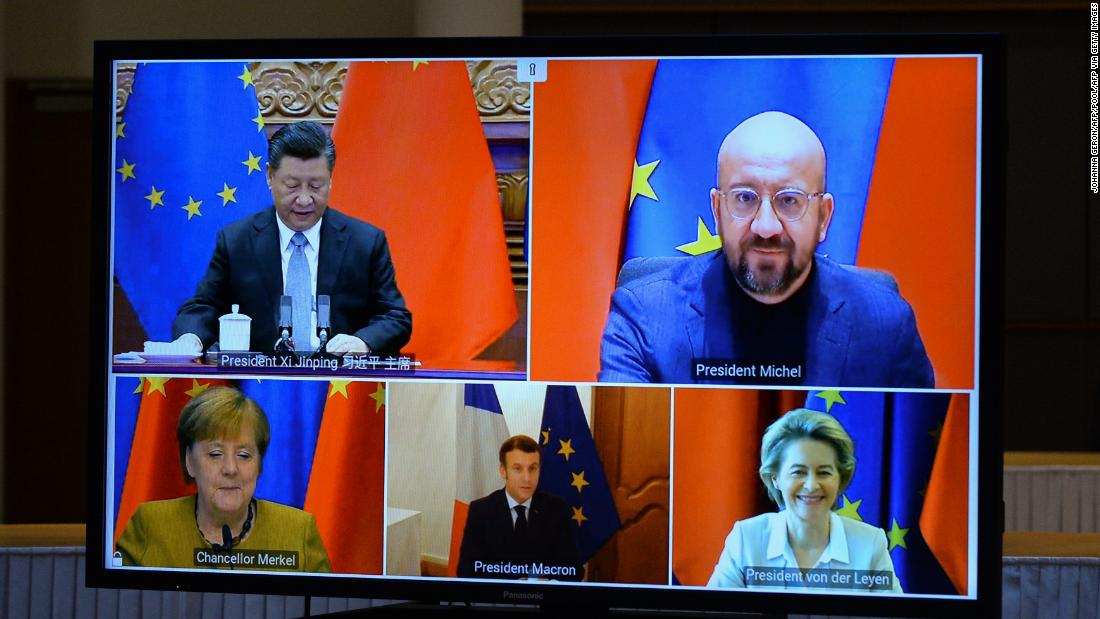
Ahead of the agreement, which will give European companies greater access to Chinese markets, a senior aide to US President-elect Joe Biden had urged EU leaders to wait and address shared concerns about Beijing with the incoming administration.
That Washington's European allies plowed ahead casts doubt on Biden's future ability to build a coalition of like-minded countries to counter Beijing, particularly if the EU, the world's single-largest trading bloc, becomes even more closely tied to China's economy.
Forced labor arguments
Growing criticism over allegations of forced labor in the western region of Xinjiang, where rights groups say up to 2 million members of predominantly Muslim minority groups have been detained in "reeducation" camps, had threatened to complicate, if not scupper, the deal.
China has consistently denied accusations of forced labor and other human rights abuses in Xinjiang.
"The stories coming out of Xinjiang are pure horror. The story in Brussels is we're ready to sign an investment treaty with China," European lawmaker Guy Verhofstadt said on Twitter Wednesday. "Under these circumstances any Chinese signature on human rights is not worth the paper it is written on."
EU leaders have framed the deal as one of simple reciprocal market access, similar to the "Phase 1" agreement between the US and China agreed under US President Donald Trump. Ursula von der Leyen, President of the European Commission, tweeted on Wednesday that the agreement will "uphold our interests" and "promote our core values." Similarly, the EU has maintained that the agreement provides a "lever" to press China on forced labor.
Under the agreement, China has committed to "work towards" the ratification of outstanding International Labor Organization (ILO) conventions against forced labor. However, critics have pointed to the lack of concrete commitments in this regard, and the fact China was a founding member of the ILO, and the rules in question have been in force for decades, without ratification from Beijing.
Earlier this month, the European Parliament, which is directly elected by citizens of the bloc and separate to the Council and Commission, passed a resolution strongly condemning "the Chinese government-led system of forced labor -- in particular the exploitation of Uyghur, ethnic Kazakh and Kyrgyz, and other Muslim minority groups -- in factories within and outside internment camps in the Xinjiang Uyghur Autonomous Region."
The statement went on to denounce "the continued transfer of forced laborers to other Chinese administrative divisions, and the fact that well-known European brands and companies have been benefiting from forced Chinese labor."
Wednesday's agreement will theoretically give those same companies greater access to China's tightly controlled market, and by extension, potentially to factories alleged to have been using forced labor.
Chinese state media has welcomed the deal, with official news agency Xinhua describing it as a "solid step towards stronger China-EU economic ties."
"The fact that Beijing and Brussels can eventually meet each other half way after many years of negotiations has demonstrated a willingness by both sides to go beyond their differences for the sake of the greater good," Xinhua said in an editorial, adding "the lead up to this milestone breakthrough has been fraught with difficulty."
The Xinhua report made no mention of forced labor.
The Global Times, a nationalist state-run tabloid, said the deal was "a New Year gift from China and the EU to the whole world," and criticized those who "chatter about geopolitics and values (when) what the public cares about the most is peaceful development."
EU-China trade deal sidelines US
European leaders would hardly be the first to hold their noses over China's human rights record in favor of economic gains. Washington strongly supported Beijing's entrance into the World Trade Organization (WTO) in 2000, despite then US President Bill Clinton having previously described China's leaders as "butchers" over the 1989 Tiananmen Square crackdown.
Under Trump, who has blown hot and cold on China, human rights have been prioritized in the past year, but took something of a backseat as a trade deal with Beijing looked likely. According to Trump's former national security adviser John Bolton, during talks with Chinese President Xi Jinping in 2019, the American leader told Xi to "go ahead with building the camps" in Xinjiang and said he didn't "want to get involved" in ongoing protests in Hong Kong.
Trump's recent campaign against China, ramped up as the coronavirus pandemic has caused chaos and misery in the US, failed to get much support from Europe. Biden is expected to keep up the pressure on Beijing, albeit with more restrained rhetoric than Trump, partly by leveraging allies to counterbalance China.
The EU said last year that it considers China to be a "strategic competitor" and a "systemic rival," reflecting a recent hardening of attitudes toward the country. Biden has gone even further, describing Xi earlier this year as a "thug" who doesn't have a "democratic ... bone in his body."
That the US could not influence the agreement this week -- with both Biden allies and members of the Trump administration criticizing the proposed deal -- shows how complicated an issue China has become, and how difficult building a transatlantic partnership to contain Beijing might be in practice, even without Trump's often inflammatory rhetoric.
"Leaders in both US political parties and across the US government are perplexed and stunned that the EU is moving towards a new investment treaty right on the eve of a new US administration," Matt Pottinger, Trump's deputy national security adviser and a strong China critic, said Wednesday. "Some European officials and commentators liked to claim that the Trump Administration was an impediment to even deeper transatlantic cooperation. Now it is plain to all that this isn't about President Trump. It's about key European officials. Look in the mirror."
"trade" - Google News
December 31, 2020 at 12:40PM
https://ift.tt/3o14OVC
Neither human rights concerns nor US disapproval could stop the EU-China trade deal - CNN
"trade" - Google News
https://ift.tt/2VQiPtJ
Tidak ada komentar:
Posting Komentar